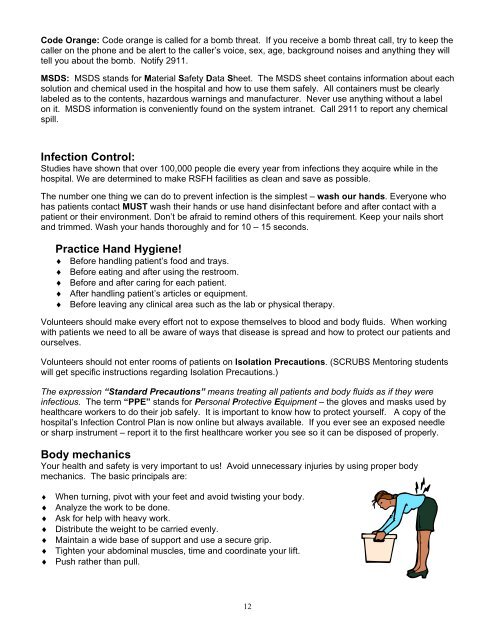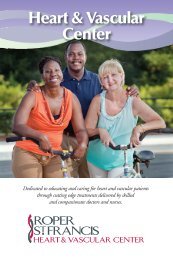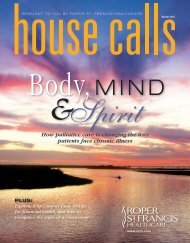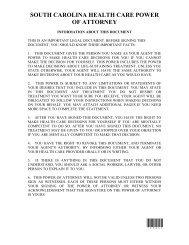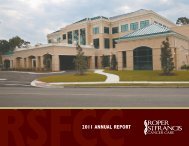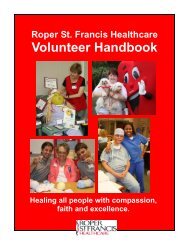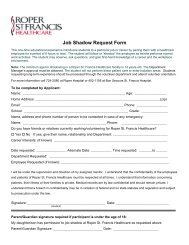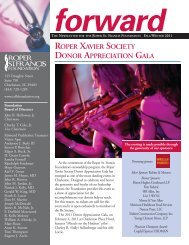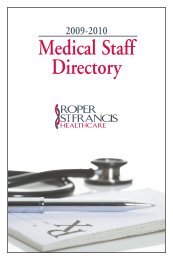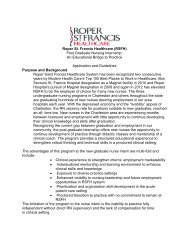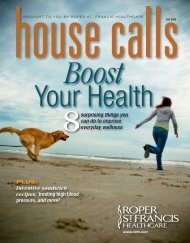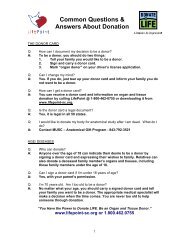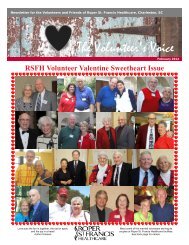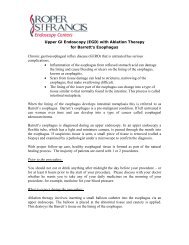Volunteer Handbook - Roper St. Francis Healthcare
Volunteer Handbook - Roper St. Francis Healthcare
Volunteer Handbook - Roper St. Francis Healthcare
You also want an ePaper? Increase the reach of your titles
YUMPU automatically turns print PDFs into web optimized ePapers that Google loves.
Code Orange: Code orange is called for a bomb threat. If you receive a bomb threat call, try to keep thecaller on the phone and be alert to the caller’s voice, sex, age, background noises and anything they willtell you about the bomb. Notify 2911.MSDS: MSDS stands for Material Safety Data Sheet. The MSDS sheet contains information about eachsolution and chemical used in the hospital and how to use them safely. All containers must be clearlylabeled as to the contents, hazardous warnings and manufacturer. Never use anything without a labelon it. MSDS information is conveniently found on the system intranet. Call 2911 to report any chemicalspill.Infection Control:<strong>St</strong>udies have shown that over 100,000 people die every year from infections they acquire while in thehospital. We are determined to make RSFH facilities as clean and save as possible.The number one thing we can do to prevent infection is the simplest – wash our hands. Everyone whohas patients contact MUST wash their hands or use hand disinfectant before and after contact with apatient or their environment. Don’t be afraid to remind others of this requirement. Keep your nails shortand trimmed. Wash your hands thoroughly and for 10 – 15 seconds.Practice Hand Hygiene! Before handling patient’s food and trays. Before eating and after using the restroom. Before and after caring for each patient. After handling patient’s articles or equipment. Before leaving any clinical area such as the lab or physical therapy.<strong>Volunteer</strong>s should make every effort not to expose themselves to blood and body fluids. When workingwith patients we need to all be aware of ways that disease is spread and how to protect our patients andourselves.<strong>Volunteer</strong>s should not enter rooms of patients on Isolation Precautions. (SCRUBS Mentoring studentswill get specific instructions regarding Isolation Precautions.)The expression “<strong>St</strong>andard Precautions” means treating all patients and body fluids as if they wereinfectious. The term “PPE” stands for Personal Protective Equipment – the gloves and masks used byhealthcare workers to do their job safely. It is important to know how to protect yourself. A copy of thehospital’s Infection Control Plan is now online but always available. If you ever see an exposed needleor sharp instrument – report it to the first healthcare worker you see so it can be disposed of properly.Body mechanicsYour health and safety is very important to us! Avoid unnecessary injuries by using proper bodymechanics. The basic principals are: When turning, pivot with your feet and avoid twisting your body. Analyze the work to be done. Ask for help with heavy work. Distribute the weight to be carried evenly. Maintain a wide base of support and use a secure grip. Tighten your abdominal muscles, time and coordinate your lift. Push rather than pull.12


